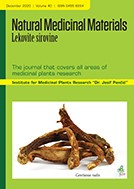Institute for medicinal plants research „Dr. Josif Pančić“ , Belgrade , Serbia
Institute for medicinal plants research „Dr. Josif Pančić“ , Belgrade , Serbia
Institute for medicinal plants research „Dr. Josif Pančić“ , Belgrade , Serbia
Faculty of Biology, Institute of Botany and Botanical Garden “Jevremovac”, University of Belgrade , Belgrade , Serbia
Faculty of Biology, Institute of Botany and Botanical Garden “Jevremovac”, University of Belgrade , Belgrade , Serbia
Institute for medicinal plants research „Dr. Josif Pančić“ , Belgrade , Serbia
This study aimed to assess the antineurodegenerative and antioxidant activity of Helichrysum plicatum flower extract, as well as to identify extract ingredients with acceptable pharmacokinetic parameters such as gastrointestinal absorption, blood-brain barrier permeation, and P-glycoprotein-mediated effusion for optimal therapeutic brain exposure. Antioxidant activity was evaluated by ABTS, FRAP, and β-carotene bleaching assays, while antineurodegenerative activity was tested using acetylcholinesterase (AChE) and tyrosinase (TYR) inhibitory activity assays. In the ABTS test, the dry extract at the highest applied concentration (500 μg/mL) showed better or similar antioxidant activity compared to the standards. In the β-carotene assay, all applied concentrations of the extract showed significantly higher activity than vitamin C. No concentration-dependent activity was observed in the AChE assay, while in the TYR assay the lowest extract concentration (100 μg/mL) showed the highest percentage of inhibition (27.92%). Pharmacokinetic parameters of compounds were predicted by in silico SwissADME online tool in accordance by the rules of drug-likeness. According to the pharmacokinetic properties, we concluded that pentoxymethoxylated flavones may represent CNS drug candidates for further studies.
This is an open access article distributed under the Creative Commons Attribution License which permits unrestricted use, distribution, and reproduction in any medium, provided the original work is properly cited.

The statements, opinions and data contained in the journal are solely those of the individual authors and contributors and not of the publisher and the editor(s). We stay neutral with regard to jurisdictional claims in published maps and institutional affiliations.